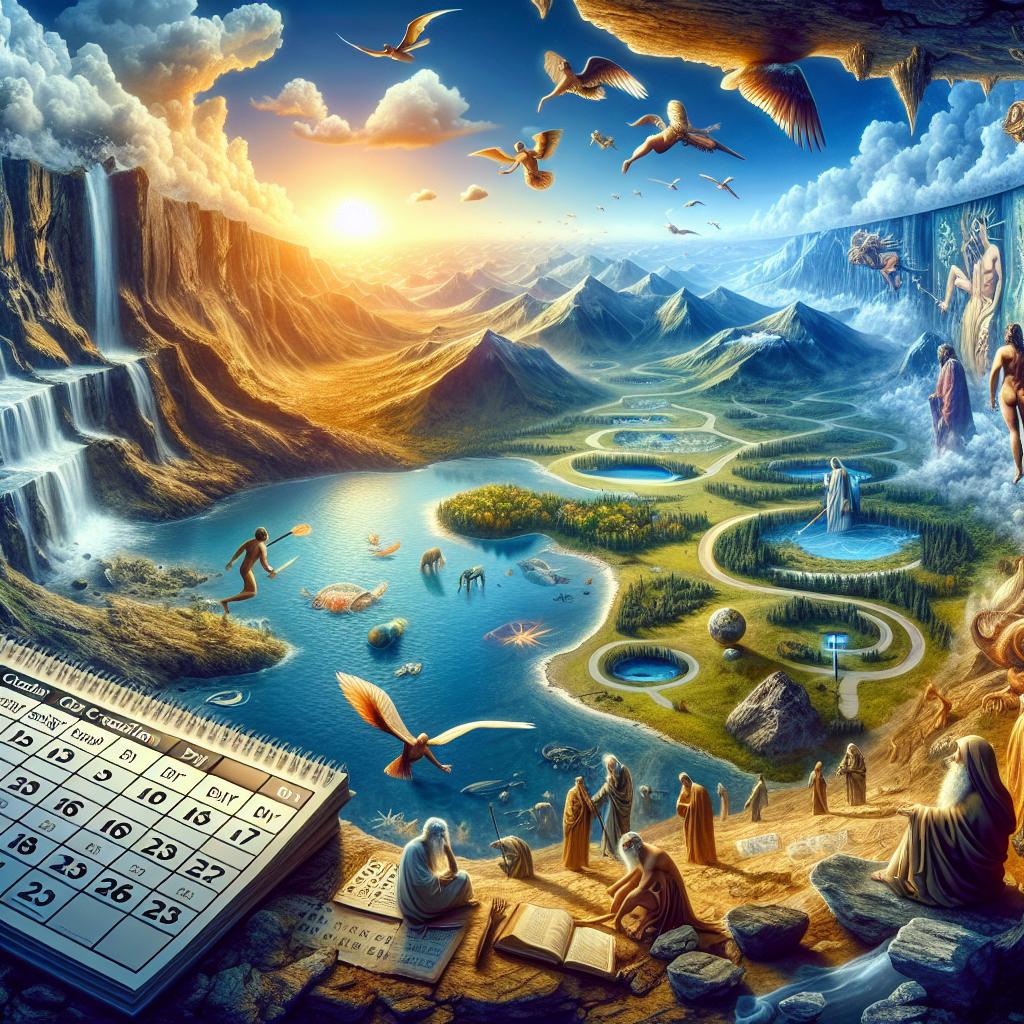
Top 10 Contrasts and Connections Between Calendar Day and Day-Age Creationists
Published: 02 August 2024
Ten Major Differences and Similarities Between Calendar-Day and Day-Age Creationists
1. Natural Biological Evolution
Calendar-Day Creationists (cdc): They believe that natural biological evolution occurs, leading to the development of new species and genera within orders and families. They argue that this is not true "biological evolution" since no new information is produced, but rather variations within created kinds.
Day-Age Creationists (dac): They hold the view that natural biological evolution fails at all levels, except for species numbering more than about one quadrillion individuals with generation times less than three months and body sizes smaller than one centimeter.
Why This Matters: The difference lies in the extent to which each group believes in the capacity of natural biological evolution to produce new species. Calendar-Day Creationists see it as a mechanism for variation within created kinds, while Day-Age Creationists believe it has limitations and cannot explain the diversity of life.
2. Laws of Physics
cdc: Calendar-Day Creationists assert that the laws of physics were radically different before Adam's sin.
dac: Day-Age Creationists believe that the laws of physics were identical before and after Adam's sin, with the exception that God withdrew some of His sustaining power.
Think About It: The disagreement centers on whether the Fall had any impact on the physical laws governing the universe. Calendar-Day Creationists suggest that there were significant changes, while Day-Age Creationists argue for continuity in the laws of physics.
3. Restored Paradise
cdc: Calendar-Day Creationists maintain that redeemed humanity will be restored to paradise.
dac: Day-Age Creationists believe that redeemed humanity will be delivered from paradise to a brand new creation.
Why This Matters: The difference lies in whether the restoration of humanity will occur in a renewed Earth or in an entirely new creation. Both groups agree on the concept of redemption, but their interpretations of the ultimate outcome differ.
4. Interpretation of Genesis 1
cdc: Calendar-Day Creationists consider Genesis 1 as an account of physical creation.
dac: Day-Age Creationists emphasize the need to integrate all ten major creation accounts in the Bible when interpreting Genesis 1.
Think About It: The disagreement centers on the interpretation of Genesis 1. While both groups affirm its factual and chronological nature, Day-Age Creationists emphasize a broader understanding by considering other creation accounts in the Bible.
5. Eternality of the Universe and Stars
cdc: Calendar-Day Creationists believe that the universe and stars are eternal.
dac: Day-Age Creationists assert that the universe and stars are temporal.
Why This Matters: The difference lies in their understanding of the origin and nature of the universe and stars. Calendar-Day Creationists suggest an eternal existence, while Day-Age Creationists see them as having a finite beginning.
6. Astronomers' Perspectives
cdc: Calendar-Day Creationists accuse astronomers of deceiving the public.
dac: Day-Age Creationists argue that astronomers are telling the truth.
Think About It: The disagreement centers on how astronomers' findings are interpreted. Calendar-Day Creationists believe that secular astronomers may be misleading, while Day-Age Creationists argue that they are providing accurate information based on their understanding of the universe.
7. Revelation through Creation
cdc: Calendar-Day Creationists believe that the heavens merely reveal the existence of God.
dac: Day-Age Creationists maintain that the heavens also reveal God's transcendent qualities and personal attributes.
Why This Matters: The difference lies in the depth of meaning attributed to the heavens. While both groups acknowledge that creation points to God's existence, Day-Age Creationists see it as a means to understand more about God's character.
8. Literal Interpretation of Genesis 1
cdc: Calendar-Day Creationists affirm that there is only one literal interpretation of Genesis 1.
dac: Day-Age Creationists argue that there are several literal interpretations of Genesis 1.
Think About It: The disagreement centers on the interpretation of "literal." Calendar-Day Creationists argue for a straightforward understanding of the text, while Day-Age Creationists suggest that there are multiple valid interpretations that align with the plain meaning.
9. Reconciling Genesis 1 with Established Record
cdc: Calendar-Day Creationists believe that Genesis 1 cannot be reconciled with the established record of nature.
dac: Day-Age Creationists assert that Genesis 1 can be reconciled with the established record of nature.
Why This Matters: The difference lies in how each group views the compatibility between the biblical account in Genesis 1 and scientific findings. Calendar-Day Creationists see an inherent conflict, while Day-Age Creationists propose ways to harmonize them.
10. Pre-Adamic Death
cdc: Calendar-Day Creationists contend that the pre-Adamic death of higher animals contradicts the character of God and the doctrine of blood atonement for human sin.
dac: Day-Age Creationists argue that the pre-Adamic death of higher animals is consistent with a loving and merciful Creator and does not impinge upon the doctrine of blood atonement.
Think About It: The difference lies in their interpretation of pre-Adamic death and its implications for God's character and human sin. Calendar-Day Creationists believe it contradicts fundamental aspects of biblical theology, while Day-Age Creationists see it as compatible with a loving Creator.
By understanding these key differences and similarities between Calendar-Day and Day-Age Creationists, we can engage in meaningful discussions about the interpretation of Genesis 1 and the relationship between biblical teachings and scientific understanding.
[END OF ARTICLE]
